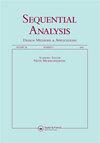Numerical solution of Kiefer-Weiss problems when sampling from continuous exponential families
IF 0.6
4区 数学
Q4 STATISTICS & PROBABILITY
Sequential Analysis-Design Methods and Applications
Pub Date : 2023-04-03
DOI:10.1080/07474946.2023.2193602
引用次数: 0
Abstract
Abstract In this article, we deal with problems of testing hypotheses in the framework of sequential statistical analysis. The main concern is the optimal design and performance evaluation of sampling plans in Kiefer-Weiss problems. The main goal of the Kiefer-Weiss problem is designing hypothesis tests that minimize the maximum average sample number, over all parameter values, as opposed to both the sequential probability tests (SPRTs) minimizing the average sample number only at two hypothesis points and the classical fixed-sample-size test. For observations that follow a distribution from an exponential family of the continuous type, we provide algorithms for optimal design in the modified Kiefer-Weiss problem and obtain formulas for evaluating the performance of sequential tests by calculating the operating characteristic function, the average sample number, and some related characteristics. These formulas cover, as a particular case, the SPRTs and their truncated versions, as well as optimal finite-horizon sequential tests. In the setting of the original Kiefer-Weiss problem we apply the method of our recent work (Sequential Analysis 2022, 41(2), 198–219) for numerical construction of the optimal tests. For the particular case of sampling from a normal distribution with a known variance, we make numerical comparisons of the Kiefer-Weiss solution with the SPRT and the fixed-sample-size test provided that the three tests have the same levels of the error probabilities. All of the algorithms are implemented in the form of computer code written in the R programming language and are available at the GitHub public repository (https://github.com/tosinabase/Kiefer-Weiss). Guidelines on the adaptation of the program code to other exponential family distributions are provided.连续指数族中Kiefer-Weiss问题的数值解
摘要本文讨论了序列统计分析框架下的假设检验问题。在Kiefer-Weiss问题中,主要关注的是抽样方案的优化设计和性能评价。Kiefer-Weiss问题的主要目标是设计在所有参数值上最小化最大平均样本数的假设检验,而不是仅在两个假设点上最小化平均样本数的顺序概率检验(sprt)和经典的固定样本量检验。对于遵循连续型指数族分布的观测值,我们提供了改进的Kiefer-Weiss问题的优化设计算法,并通过计算运行特征函数、平均样本数和一些相关特征得到了评价序列试验性能的公式。作为一种特殊情况,这些公式涵盖了sprt及其截断版本,以及最优有限视界序列测试。在最初的Kiefer-Weiss问题的设置中,我们应用我们最近工作的方法(顺序分析2022,41(2),198-219)进行最优测试的数值构建。对于从方差已知的正态分布中抽样的特殊情况,我们对Kiefer-Weiss解与SPRT和固定样本量检验进行了数值比较,前提是这三种检验具有相同的误差概率水平。所有算法都是以R编程语言编写的计算机代码的形式实现的,并且可以在GitHub公共存储库(https://github.com/tosinabase/Kiefer-Weiss)中获得。提供了使程序代码适应其他指数族分布的指南。
本文章由计算机程序翻译,如有差异,请以英文原文为准。
求助全文
约1分钟内获得全文
求助全文
来源期刊

Sequential Analysis-Design Methods and Applications
STATISTICS & PROBABILITY-
CiteScore
1.40
自引率
12.50%
发文量
20
期刊介绍:
The purpose of Sequential Analysis is to contribute to theoretical and applied aspects of sequential methodologies in all areas of statistical science. Published papers highlight the development of new and important sequential approaches.
Interdisciplinary articles that emphasize the methodology of practical value to applied researchers and statistical consultants are highly encouraged. Papers that cover contemporary areas of applications including animal abundance, bioequivalence, communication science, computer simulations, data mining, directional data, disease mapping, environmental sampling, genome, imaging, microarrays, networking, parallel processing, pest management, sonar detection, spatial statistics, tracking, and engineering are deemed especially important. Of particular value are expository review articles that critically synthesize broad-based statistical issues. Papers on case-studies are also considered. All papers are refereed.
 求助内容:
求助内容: 应助结果提醒方式:
应助结果提醒方式:


